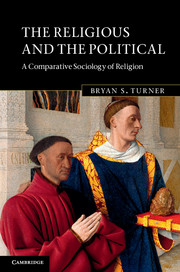Book contents
- Frontmatter
- Contents
- Acknowledgements
- Introduction
- Part I The religious and the political
- Part II State management of religion
- Part III Comparative and historical studies
- 8 Buddhism and the political: the sangha and the state
- 9 Confucianism as state ideology: China
- 10 Religion, state and Japanese exceptionalism: nihonjinron
- 11 State and Turkish secularism: the case of the Diyanet
- Part IV Conclusion
- References
- Index
8 - Buddhism and the political: the sangha and the state
Published online by Cambridge University Press: 05 April 2013
- Frontmatter
- Contents
- Acknowledgements
- Introduction
- Part I The religious and the political
- Part II State management of religion
- Part III Comparative and historical studies
- 8 Buddhism and the political: the sangha and the state
- 9 Confucianism as state ideology: China
- 10 Religion, state and Japanese exceptionalism: nihonjinron
- 11 State and Turkish secularism: the case of the Diyanet
- Part IV Conclusion
- References
- Index
Summary
Introduction: Max Weber’s The religion of India
Contemporary scholars of religion are often deeply suspicious of the use of such expressions as ‘the religion of India’ or more generally ‘the religions of Asia’, or worse still ‘the Asian religions’. The anthropological argument, which we came across in Chapter 6, is that in trying to generalize about religions we are often unwittingly working with a Western – or, more specifically, a Protestant – view of what counts as ‘religion’. This implicit Protestant view in emphasizing correct belief over ritual practice and community raises problems about how we regard ritual traditions that are associated with ‘other religions’. This raises difficulties about what belongs to culture and what to religion (Asad, 1993; Keane, 2007). Is ‘Hinduism’, which is an umbrella term for a cluster of diverse beliefs and practices, a ‘religion’, or is it simply the ‘culture’ of South Asia? To some extent ‘Hinduism’, as simply the religion of the ‘Hindu’, was a creation of British administrative policies in India and the efforts of Christian missionaries in translating Christian ideas into Indian culture (Viswanathan, 1996).
A modern approach to defining ‘Hinduism’ attempts to capture the diversity of an evolving tradition by noting that ‘It is a cumulative collection of communities, faiths, beliefs, and practices that have come together over the centuries, although its ancient roots are traditionally seen in the cultures of the Indus Valley, Saraswati River civilization, and Indo-European people’ (Narayanan, 2005: 15). In defence of Weber, he appeared to be aware of these difficulties, observing:
It may well be concluded that Hinduism is simply not a ‘religion’ in our sense of the word. . . . What the Occidental conceives as ‘religion’ is closer to the Hindu concept of sampradaya. By this the Hindu understands communities into which one is not born . . . but to which one belongs by virtue of a common religious aspiration and common sacred paths.
(Weber, 1958: 23)- Type
- Chapter
- Information
- The Religious and the PoliticalA Comparative Sociology of Religion, pp. 153 - 169Publisher: Cambridge University PressPrint publication year: 2013



